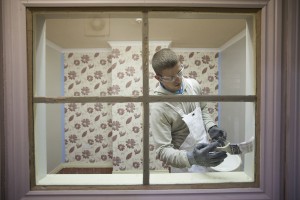Phased Tests
 Phased Tests were introduced in 2013 as an annual milestone in the apprenticeship, which is delivered and assessed by the college.
Phased Tests were introduced in 2013 as an annual milestone in the apprenticeship, which is delivered and assessed by the college.
They are a formal, practical progress test of the skills and competencies developed in each year of the apprenticeship and reflect the standards of each craft at the end of each year. They are competence based, confirming attainment of the required performance levels.
Apprentices take the Phased Test in the last block of college and must pass them to progress to the next year of the course. SPADAC has also linked Phased Tests to progression to the next rate of apprenticeship wages.
As Phased Tests are evidence for the Construction Craft Competence Assessment Unit then the product evidence and assessment records must be subject to the Centres’ normal quality assurance process and this evidence must be internally verified by the assessment centre.
The Candidate Record of Evidence from the Workplace is designed to enable college staff to monitor apprentices’ progress on site through receiving appropriate complimentary industrial experience to support their development.
During apprenticeship training, candidates will undertake work allocated by their employer, which will complement the training they receive while at college. It is vital that they receive this industrial experience.
For CREWS, the apprentice will gather the evidence on site on a form issued at college and request their supervisor to sign each CREW agreeing that they have experienced this type of work.
During the periods that they are working in industry, apprentices must gather evidence of the work undertaken by completing the first page of each CREW. This can be done by:
- Gathering photographs, sketches or drawings of the work they have been doing
- Writing a brief description of the type of work they have been experiencing
The college lecturer will discuss the CREW with the apprentice during their college training and reference this evidence against the SVQ and National Occupational Standards (NOS). This will enable future actions and training they need to develop to be identified and agreed.
[/spoiler]







